#Jet meta
Text
And please reblog for a larger sample size and put your reasons for voting the way you did in the tags.
24 notes
·
View notes
Note
Do you think Toph and Jet would get along?
I think they would fight more than Katara and Toph. Toph was projecting her issues onto what Katara was saying, so most of their arguments were Toph misunderstanding Katara and being pretty bratty and rude about it, and then Katara getting fed up and striking back.
But there's nothing deep they need to understand or overcome about each other. Toph is emotionally intelligent at times, and Katara is very willing to help and understand others. Similar to canon, they can easily come to an understanding, and they didn't butt heads every episode.
With Jet and Toph though, it's much different. There is a class difference for one. Toph enjoyed wealth and safety from the war. Jet obviously didn't.
The show never really acknowledges that Toph never cared about the war and just wanted freedom from her parents, so encountering people who suffered in war would be something entirely new to her. Think Zuko or Azula, except without having harmed anyone. Toph is the same as them.
Jet is also similar to Katara. They both work in groups as a team. Toph not helping the others would also bother Jet. Toph also has endangered the Gaang a few times.
Say Jet was there when Toph was doing all those scams. Jet would completely support scamming the Fire Nation at any other time, but he wouldn't then because it would be too dangerous to risk getting attention. Basically, he'd side with Katara. And unlike Katara, Jet has been in the war a lot longer and has probably buried people he loved, and Toph and the others continuing the scams would completely piss him off.
One thing going for them is that Jet was the leader of many kids and a bunch of them had to have been brats and unwilling to listen. So he probably has experience dealing with stubborn people. Also he seems to have a talent for working with people with unique of different skillsets, and Toph's way of bending is obviously unique.
The other thing is that Toph loves to rebel, which is everything Jet does.
But the Earth Kingdom never took care of orphans, so Jet would probably resent the wealthy, especially if it was someone who easily left it and only complained about how annoying it was to live that way.
Also Toph wouldn't really understand why Jet would hate the Fire Nation so much. She didn't really care about Zuko. Because he and the Fire Nation never affected her life.
Toph is a very sheltered and protected kid with far too much wealth and what makes it worse is that she never recognizes it and doesn't care about it.
Jet would have problems getting along with her, and Toph would respond to it equally.
Obviously they could eventually get along, but it would take Toph realizing how well off she had it compared to others, and for Jet not to project all of his rage against his people onto her.
I've seen a few fics redeem Jet and try to write it like how redeemed Zuko is always written by making him befriend Toph. And I'm always wondering how?
55 notes
·
View notes
Note
Do you agree that Jet's death was unfair?
Not really, he got killed, that happens, it's not more unfair than any other death in a war really.
Thanks for the ask ^^
2 notes
·
View notes
Note
what do you think about jet
Jet isn't one of my favorite characters but I don't hate him (even if I do joke about that because he was about to blow a dam, a thing a like).
In the show he was a character that showed just how much the war affected children. Left an orphan he found his purpose in fighting the war against the people that harmed him. Ultimately with his passion and drive leading him to want to destroy a dam that would have likely caused more harm to the friendly civilian population then the Fire Nation.
But more importantly was his desire to grow out of it with Smellerbee and longshot in Ba Sing Se. Unfortunately for some people leaving that life is harder and it draws them back. Leading Jet to look for Fire Nationals in Ba Sing Se. He was right and justified in his mistrust of Zuko. But it still goes to show how hard it can be for a child soldier to reintegrate into society. Looking for threats and dangers never stop, they never feel safe.
Jets end was very tragic. He was never able to find his peace. To move on or make a life for himself. Those who should have been focused on protecting him instead kidnapped and brainwashed him. And ultimately died fighting people who should have been on his side.
The fact that writers decided to make a joke about his death instead of focusing on the tragedy of it. Of the inability for people like him to reintegrate is maddening. Jet deserved better than that.
#wiskey answers#imjustanothercowboy#jet#jet meta#he is a good character#fits well for a tragic one#i don't think they got the full potential from him#portraying him as a bad guy for investigating zuko and iroh was dumb#he was right#that was a good thing#but tragic that that part of him was never able to be shut off#them joking about his death was dumb#jet deserves better
10 notes
·
View notes
Text
Katara and Mutuality in Relationships
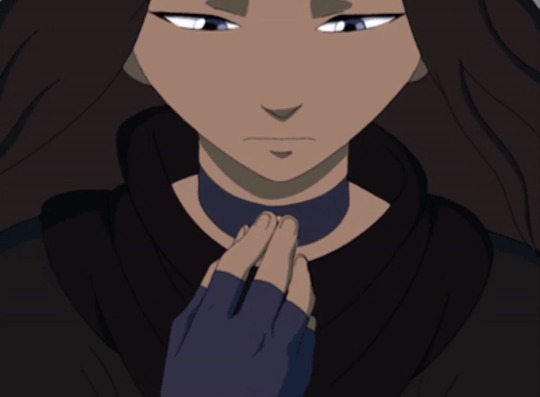
There are lots of conflicting opinions about which characters Katara felt attraction towards, which characters she didn’t, and how long she felt that attraction. I see in most cases, people point to quick clips of her faintly blushing or kissing another character on the cheek as evidence, but I think these kind of takes miss the nuance of the purpose attraction serves in a story.
Most importantly, I see these characters treated as if they are actually people capable of making their own decisions. It’s important to remember that these are fictional characters. They don’t make their own choices; the writers make their choices for them for the purpose of telling a story. From that standpoint, it’s more valuable to examine how a character’s story and narrative themes tie into their relationships with other characters. Animators can shove in a kiss or a blush wherever they want, but it’s harder to demonstrate through storytelling how and why two characters might feel attraction towards one another, and how a relationship between them would develop both characters and contribute to the overarching themes of the story.
In other words, when discussing which characters Katara is “attracted” to, I’m discussing which relationships and actions within the narrative build on her established story and arc. Romance is always integrated into a story for a reason, and considering that reason is important.
Unfortunately, ATLA is very much a product of its time in this way. It’s easy to see what romance adds to the arcs of the male characters—but not so much with the female characters. All three canon relationships (kataang, sukka, and maiko) follow this trend to some degree. The primary purpose of the woman in this narrative is to act as a prize for the man for performing some good deed. Once they’re together, she ceases having her own motivations and becomes an extension of the male character she’s dating. This is pretty blatant with Suki—she barely had a personality in that later seasons; she is there to be Sokka’s girlfriend. Similarly, Katara becomes a completely different character—she’s even animated differently—when the narrative pushes her into romantic scenes with Aang. Her character is flattened.
So what is Katara’s arc, and how do the romantic interactions she has throughout the series contribute to this?
Well, that could be a whole other essay itself, but to put it simply, Katara’s arc is one of a young girl devastated by grief at a young age clinging to hope that she has the power to fight and change the world for the better. Which she does as she gains power and confidence throughout the series—culminating in her defeating Azula in the finale.
But the part I want to focus on here is how Katara connects with other characters. She connects with them over shared experiences of grief and loss.
Take Haru, for instance.
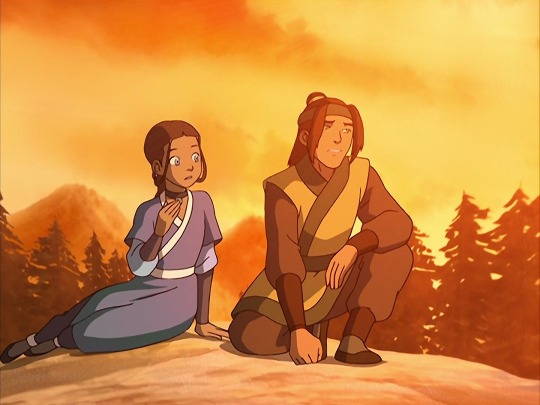
Haru: After the attack, they rounded up my father and every other earthbender, and took them away. We haven't seen them since.
Katara: So that's why you hide your earthbending.
Haru: Yeah. Problem is…the only way I can feel close to my father now is when I practice my bending. He taught me everything I know.
Katara: See this necklace? My mother gave it to me.
Haru: It’s beautiful.
Katara: I lost my mother in a Fire Nation raid. This necklace is all I have left of her.
Haru: It’s not enough, is it?
Katara: No.
This isn’t just a throwaway moment; it’s an important character moment that leads up to growth and the progression of Katara’s overall story, both in this individual episode and in the whole series.
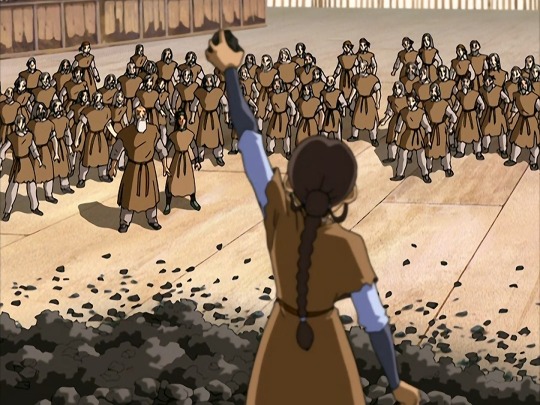
Katara finds her power in the connections she’s able to make with other characters. It’s a powerful driving force for her that makes her a strong character even before her bending abilities develop. Imprisoned was such an important episode to establish who Katara is and what her power is, and adds so much to her arc.
But there is one line in particular from the above exchange that also stands out: Haru says “it’s not enough, is it?” and Katara agrees. Even this early in the series, we’re establishing the fact that despite her drive and hopeful outlook, Katara feels deeply hurt, she feels a deep sense of loss that she opens up about to other characters in moments like these. But unlike Haru…Katara can’t go rescue her mother. Her mother is dead, and we see her grapple with that grief throughout the series.
Another character she reaches out to like this is Jet.
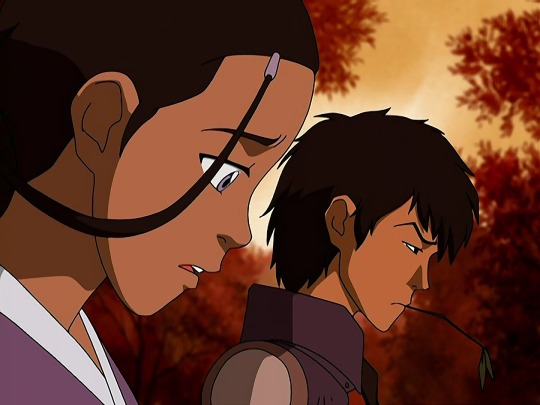
Jet: Longshot over there? His town got burned down by the Fire Nation. And we found The Duke trying to steal our food. I don't think he ever really had a home.
Katara: What about you?
Jet: The Fire Nation killed my parents. I was only eight years old. That day changed me forever.
Katara: Sokka and I lost our mother to the Fire Nation.
Jet: I’m so sorry, Katara.
Another important note about Jet is that there are explicit romantic feelings from Katara in this episode. Again, Katara empathizes with another character through a shared sense of loss. Sadly, in this case, Jet manipulated her feelings and tricked her into helping in his plot to flood the village…but those feelings were undeniably there.
That was the tragedy in this episode, but it also gives the audience so much information about Katara as a character: what motivates her, and what she wants. Katara is established as a character who wants someone who will connect with her and empathize with her over her loss—her greatest sense of trauma. She wants to help others but also receive support in return. The reason why she was smitten with Jet, beyond just initial attraction, is because he gave her a sense of that before Katara realized his true motivations.
A lot of people make the claim that Aang is good for Katara because he also feels a sense of great loss and trauma. And while on paper that’s true…does he really demonstrate that? I just gave two examples of characters Katara connected with this way, and both responded with deep empathy to what she said. Very early on in the show—the third episode—Katara attempts to connect with Aang the same way. How does he respond?
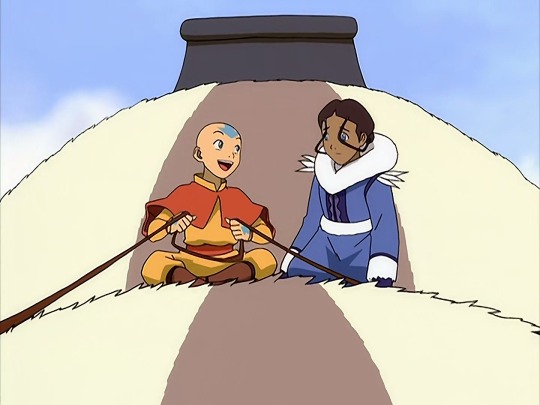
Katara: Aang, before we get to the temple, I want to talk to you about the airbenders.
Aang: What about 'em?
Katara: Well, I just want you to be prepared for what you might see. The Fire Nation is ruthless. They killed my mother, and they could have done the same to your people.
Aang: Just because no one has seen an airbender, doesn't mean the Fire Nation killed them all. They probably escaped!
Just compare this exchange to Haru and Jet. No effort to empathize, not even a “sorry for your loss” or anything. It’s a stark contrast, and the reason for that is because this narrative entirely centers Aang. Katara’s narrative always seems to be secondary to his when they’re together—which is exactly my point when I say this relationship has a fundamental lack of mutuality. It’s built that way from the beginning of the series. It does not add to Katara’s arc nor establish what about this dynamic would attract her.
And, look, before someone jumps down my throat about this…I’m not saying Aang is a horrible person for this response. I think it’s a sign that he’s immature and has a fundamentally different approach to problems than Katara. Katara is a character who has been forced to take on responsibilities beyond her years due to being a child of a war-torn world. Aang’s approach to problems is avoidance while Katara never had that luxury. It doesn’t mesh well.
This is all in Book 1. I honestly could have gotten on board with Kataang if the series meaningfully addressed these issues…but it didn’t. In fact, they actually got worse in some ways.
Back to Katara’s mother. We’ve established that this is a core part of Katara’s character and like in the scene with Haru, she indicates that this is an unresolved issue that pains her. But then, in Book 3, Katara actually does get a chance to confront this pain.
This would have been a powerful moment. Surely the character who is meant to be her partner, her equal, would have been there for her. Surely he would have understood and supported her, fulfilling her narrative and adding to her story.
But Aang didn’t do that. I won’t go into details because there are a million analyses out there on The Southern Raiders, but Aang’s response to Katara was the opposite of understanding. He got angry with her, insinuated that she was a monster for wanting revenge, and tried to dictate her behavior according to his own moral values. And importantly, from a narrative standpoint, he did not go with Katara. One of the most important events in her arc, and Aang didn’t support her—he actually tried stopping her. He didn’t contribute to her growth and development.
Also noteworthy:
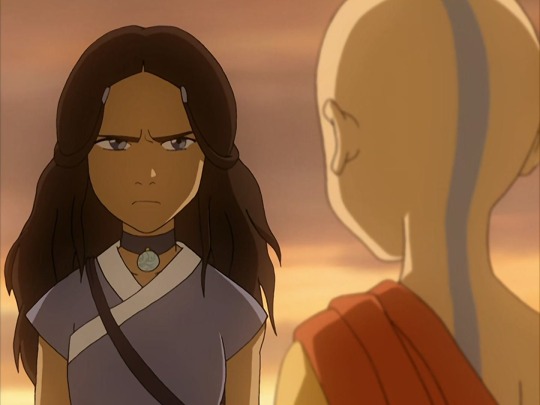
Katara: But I didn’t forgive him. I’ll never forgive him.
Even at the end of the episode, Aang clearly doesn’t understand at all what Katara is feeling. This line demonstrates it perfectly. He thinks she forgave him when that wasn’t the case at all…but of course, he didn’t even accompany her, so he didn’t see what actually took place. His worldview is fundamentally different from hers, and he’s consistently too rigid in his morality and immature to center Katara’s feelings.
Throughout Katara’s whole arc, her most significant character moments, Aang’s character just doesn’t come through the way Katara’s constantly does for him. Their narrative lacks mutuality. When Katara and Aang are together, she becomes an accessory to him. The ending scene is a perfect demonstration of this.
Now, to address the elephant in the room.
Which character does actually add to Katara’s narrative and support her growth as a character?
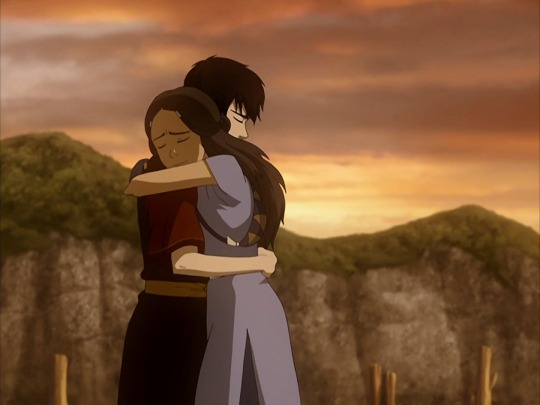
Correct! I just talked about how important The Southern Raiders is to Katara’s character and story, how it’s a chance for her to finally address the grief she’s been carrying since Book 1. And who stood by her side throughout this pivotal moment? Right—Zuko did.
You can talk all you want about how he’s a “colonizer” while Aang’s people suffered genocide, but you’re forgetting that “show, don’t tell” is one of the most basic aspects of storytelling. The fact is, despite how it looks on paper, Zuko was the one there for Katara at her critical moments. Zuko empathized with Katara more than Aang ever did—as demonstrated in this episode. Zuko never once brought up his own cultural values. Zuko never once told Katara what to do. Zuko’s position was that Katara should be the one to decide, and that he would support any choice she made. He supported her decision to spare Yon Rha, but he would have also supported her if she decided to kill him. I actually found this episode to be a satisfying reversal to what is typically seen in TV—for once, the female character is centered while her male counterpart takes the backseat and becomes a supporting role to her narrative.
Even before this, Zuko is shown to empathize with Katara.
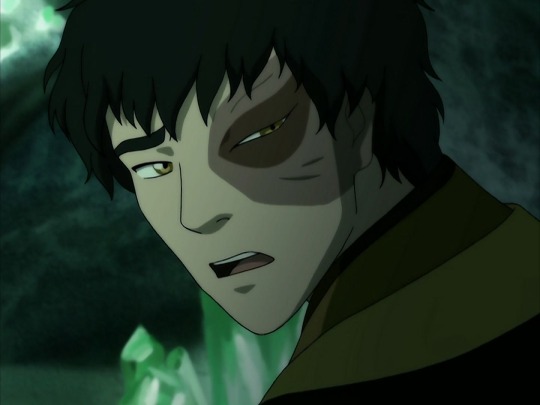
Zuko: I’m sorry. That’s something we have in common.
I think what gets me about this scene is the fact that he’s still Katara’s enemy, and she was just yelling about how she hates him and his people. But despite that, Zuko still empathizes with Katara. She is fundamentally human to him, and he expresses that to her in a way that allows them to connect. Zuko stands to gain nothing from this. It’s true that Azula entered the picture and twisted things around—but in this moment, Zuko’s compassion is genuine. His instinct was to respond to her grief with empathy, just like she consistently does for other characters.
And finally, how else does Zuko add to Katara’s arc?
I don’t think there is any more perfect of an example than the finale itself—the culmination of the arcs and development of all characters.
Zuko and Katara fight together. In a heartbeat, Zuko asks Katara to fight by his side against Azula, because he trusts her strength. She’s his equal—both in his mind, and in a narrative sense.
Then, this:
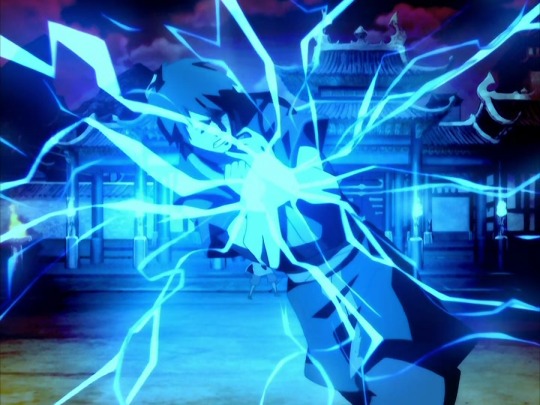
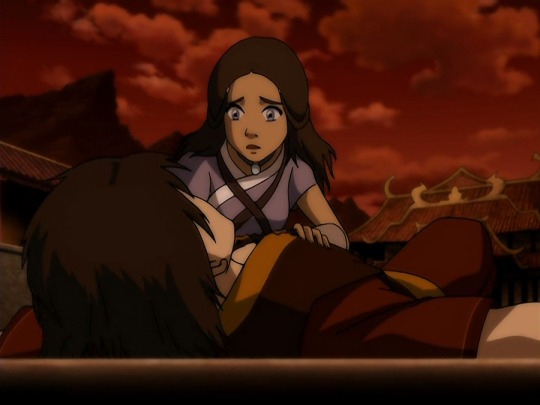
Both of their roles are so critical in this fight. They both save each other. The scene has such raw emotion to it. These characters were together at the conclusion of their respective arcs for a reason.
This is the perfect conclusion to Katara’s arc. She just played a critical role in ending the war that has caused her trauma her whole life. She just demonstrated her mastery of waterbending (another thing she’s dreamed of throughout the series) by defeating the world’s most powerful firebender during Sozin’s Comet. Even though she had help as all characters do, these are victories that belong to her and demonstrate the growth and power of her character. And to top it all off? She was able to save Zuko’s life. She didn’t have to endure the pain of feeling helpless to do anything while someone else died for her; this time, she had an active role, she changed her fate, and she prevailed. Zuko plays an important role in Katara’s story without dominating it. They perfectly represent mutuality. They add to each other’s stories. Their narratives become stronger when they’re together, without one diminishing or sidelining the other.
So, from that standpoint, that’s why I always see the attraction between Zuko and Katara and why I see it lacking between Aang and Katara. Zuko and Katara’s story doesn’t need some cheap little throwaway moments to shine. It’s integral to both characters’ stories. We are shown not told of the way these characters feel about each other. Given everything we know about Katara, her goals, her values, her past loves…absolutely everything points to Zuko being the true subject of her feelings.
Because let’s be honest. The ending I just described is so much more powerful and so much more Katara than seeing her being relegated back to a doe-eyed love interest for Aang to kiss. It hardly even made sense—Katara played no role at all at the culmination of Aang’s arc. She was relegated back to a love interest, rather than the powerful figure we saw fight alongside Zuko.
#zutara#katara#zuko#atla#anti kataang#canon critical#jet#haru#katara deserved better#aang critical#meta#analysis
395 notes
·
View notes
Text
This is technically in response/as an addition to a post on the supposed ‘double standard’ in the fandom between Zuko and Jet as Katara’s love interests, but it’s been so long since it was posted and I figured the OP would be entirely uninterested in my word vomit, especially after like one and half years—so, separate post. I added a link for those interested. There's a cut because this got quite long lmao.
In short, the post supposes the argument that though Jet would’ve made Katara kill people (something Zuko very much Did Not Do, no matter what you think about The Southern Raiders), he cleaned up his act after this. Zuko, on the other hand, did lots of Really Bad Things to Katara & Co. with far more frequency than Jet did and got redeemed after a multitude of episodes doing Various Things Moste Evile. To then slap Jet with The Toxic Ex-label and see Zuko as the ‘healthier’ and ‘better’ option creates a Double Standard(™) within the fandom, which is supposedly bad and not an arguably incorrect reading.
But the differences in fandom perception between Jet and Zuko as Love Interests for Katara (one of which canonically, and the other potentially and apparently talked about in the writer’s room) are easily explained, as can the Supposed Double Standard—just by thinking about it from Katara’s viewpoint, or even the audience’s. Because, well, the worst things Jet ‘almost’ ended up doing didn’t happen because of outside interference only.
That’s the important bit here. He 100% would’ve drowned an entire village just to get rid of a handful of Fire Nation soldiers, had Sokka not managed to evacuate everybody. He 100% would’ve grievously injured two people who, as far as Jet and everybody else were aware, were refugees who might not even be firebenders — considering nobody else saw Iroh heat up his tea, he could’ve been wrong — in an attempt to prove his own hunch. Had the guards not been there, had Zuko not been able to fight back with swords, Jet would’ve genuinely attempted to wound them for as much as a puff of smoke. And Jet consistently involves bystanders (innocent or not) in his desperate quest to harm and defeat the Fire Nation: the Gaang (and particularly Katara, through explicitly manipulative means) and the villagers in Jet; Zuko, Iroh, and the people in the teashop in City of Walls and Secrets. Additionally, we don’t see more violence from him because he’s not a main character like Zuko is—though it’s implied that Jet beats up villagers who are supposedly in cahoots with the Fire Nation often, only agreeing to turn over a new leaf when he, Smellerbee, and Longshot decide to move to Ba Sing Se.
Zuko explicitly and frequently doesn’t harm people: that, or it isn’t important to the plot. He doesn’t burn down the village on Kyoshi, he literally only manages to lightly singe it. He threatens people with violence frequently but never actually goes in for the kill. I’d argue that the most explicitly violent thing he does in Book 1 is breaking Aang out of the Pouhai Stronghold—for his own ends obviously, but if it’s spelled like treason and sounds like treason, it’s probably treason. When he thinks of robbing the pregnant couple while he’s on the run, he stops himself of his own volition; when he considers using Appa to catch Aang (this was a point made against Zuko in the post), he’s unaware of what Appa’s been through prior to that point and sees him as no more than an animal used for travel, much like the ostrich horse he stole earlier in the season.
Zuko’s schtick throughout Book 1 and 2 is that he doesn’t want to think of the consequences of his actions. His plans are never fully complete. He doesn’t think of how he’s going to get a chained, notoriously slippery little eel of an Avatar to the Fire Nation, and he doesn’t think about what would happen to twelve-year-old Aang after they got there—which is horrible of him, but it also shows an odd, ignorant kind of innocence that you’d associate with a kid who’s got a hard time telling right from wrong. Like, I love Zuko dearly, adore him even, but kiddo doesn’t think ahead until the Book 2 finale and even that’s debatable. He’ll eventually start thinking ahead a little bit but for the most part, he doesn’t. Not saying that takes away responsibility, because it absolutely doesn’t, but it is telling of Zuko’s character: he’s an ‘act first, think later’-kind of guy, all ‘fuck around; find out; maybe success’. His sole goal throughout Book 1 and 2 is going home, without even thinking on how to get there beyond like, Avatar in my custody => back in Fire Nation with Avatar => dad loves me again. And he says that his only intention is to go home too, in Ep 2 of Book 1:
Aang: If I go with you, [He holds his staff in front of him as an offer, making sure Zuko understands that he does not wish to continue fighting.] will you promise to leave everyone alone?
[The camera cuts to a side-view of the area, Zuko's men still surrounding him, spears poised. After a brief moment of hesitation, Zuko erects himself and nods in agreement. Aang is apprehended by Zuko's men, who take his staff . . . ]
Zuko: [Boarding the ship up the walkway. Determined.] Head a course for the Fire Nation. I'm going home.
(Added emphasis for my point)
Zuko is not the Big Bad. He’s not The Largest Threat. He never is. In Book 1 it’s Zhao, in Book 2 it’s Azula, and in Book 3 it’s Ozai. Zuko is a consistent threat, yes, but not a particularly large one no matter how good of a fighter he is. Because he’s presented to us as a disastrously hurt and traumatised little brat who we, the audience, are supposed to feel sorry for, and slowly grow fond of. Because we learn in The Storm that the notion of “caring for others is weak” has literally been branded into him. Because he keeps getting back up to fight, but consistently holds back. We are shown that he knows, on some level, that what he’s doing is wrong: the text suggests that Zuko is actively suppressing his morals. And by the time Zuko hires an assassin to ensure the Avatar is dead, we know that Zuko is incredibly unhappy with his choice(s) and is desperate to be safe; that he’s uncomfortable but wants to be comfortable; that he’s incorrect about the source of his fear while he’s back in the palace. The audience is shown this explicitly.
By contrast, we’re shown that Jet is fully aware that those villagers will die. He’s fully aware that, if he manages to prove the two refugees are firebenders, they’ll be arrested and probably mutilated (if the hand-crushing is any indication). I love Jet and his character, but he’s supposed to be the example of poisoning yourself with your hatred, anger, and hurt. He’s revenge that goes too far, because he doesn’t allow himself closure. He knows the consequences and isn’t shown to care for them, as long as his goal is furthered.
And there is the small, but significant, difference between the two characters: Zuko initially just wants to capture the Avatar, is purposefully remaining unaware of what will happen when he does so, and is clearly shown to change, while Jet just wants to punish firebenders and is very aware of what will be necessary for him to do so, with a handful of lines of how he ‘stopped being like that’. And honestly, Jet is far more mature than Zuko is for quite some time, regarding the violence of war—basically as mature as Zuko eventually becomes at the tail-end of his redemption arc. But Zuko’s maturity is at that point healthier, because he doesn’t want to genuinely do harm.
In regards to their separate relationships with Katara, there’s these fantastic points that @sokkastyles made in reply to the post:
The fact that Zuko actually did change and Katara actually forgave him makes ALL the difference. [ . . . ] The thing about Jet is how manipulative he was with Katara. He not only almost made her kill innocents, but he lied to her about the man he attacked having a knife when he was called out, so that Katara would see her as righteous. Someone who is willing to lie in order to make themselves seem good and someone who says they are going to change but then does the same things doesn’t have a good track record, and that’s a more troubling relationship dynamic than someone who acts as an upfront enemy but then sincerely changes.
And:
I do think it makes sense to focus on manipulation being worse than being a cartoon villain when we're talking about personal relationships. I think many people can relate to having someone like Jet in their lives who seems nice but who lies and manipulates to justify their own bad behavior despite repeatedly claiming that they will change. Not that many people will experience being tied to a tree by someone who wants you to tell them where the Avatar is, and it is completely reasonable for people to be more forgivable of things Zuko did as a villain than things Jet did to Katara when he claimed to be a friend.
I actually don’t have anything to add to this, lol. It’s succinct and well-worded.
Lastly, in addition the relatability and the relationships being different (the manipulative, emotionally hurt, and self-proclaimed anti-hero versus the initially childish, explicitly confused and desperate cartoon villain, plus the girl they hurt horribly), there’s also the problem of Jet not being a main character. Jet is a relatively well-written side character, whilst Zuko is very quickly established as a main-ish character with his own POV (as the writers decided during the conceptualisation that he’d be joining Team Avatar eventually). Zuko’s troubling, self-destructive nature that has been forced upon him and his Tragic Childhood is shown in high definition. The audience is supposed to eventually be okay with Zuko and hopefully like him, slowly adding puzzle pieces to complete the picture of a horrific earlier youth and treatment by nearly everybody he knows except Iroh. Something like this isn’t necessary with Jet, not just because he was already incredibly likeable and understandable from his introduction and onwards, but also because he’s neither a villain nor a main character.
There’s multiple reasons as to why Zuko is often seen as the ‘better’ option, just like there are multiple reasons why Jet and Zuko are compared so frequently—they’re both traumatised teenage boys who ‘rebel’ to get some semblance of control back, but we see Zuko change into a kid anyone would be a little bit proud and fond of and that doesn’t happen with Jet. Double standard or not, Zuko and Jet are different characters who the writers also treated very differently, on purpose. It makes sense to me that the audience would think Zutara is the ‘less bad’ or far better option. We know far more about Zuko than we know about Jet; and Jet’s redemption arc, if we can even call it that, halts permanently when Zuko’s is reaching the height it for him to go into a freefall, ultimately culminating in a genuine redemption. We, the audience, know this. So does Katara.
#atla meta#zutara meta#not tagging this j*t*ra bc its a bit negative and i do not want to infringe on anyone's tag lmao#but i will tag it#jetara critical#just to be safe#jet atla#prince zuko#katara#zutara#the thing about both these ships is that katara can be put down as making an active choice in the narrative#though it wants to punish her for it#she is Wrong. he is Bad Guy. here's Better Guy go have babies#regardless. i feel like post-redemption zuko would be easier for her to choose--because she saw the proof of his change
156 notes
·
View notes
Text
Selfish Desires and the Class War: Dead Friend Forever
Ever since @nyxelestia's great additions to my tags about how Phee has been able to process his grief in comparison to Tan, and succinctly stated how class theorists regard poverty as a type of violence, I can't help but take a bit of a socio-economic look at the DFF's group of friends. Particularly, episode 10 really served to solidify my theory on the underlying commentary DFF is making regarding selfishness and the different abilities to skirt punishment dependent on class.
For this one, I'm going to break this down in a couple of categories: first, I'm going to explain Hobbes' theory on human nature and Marx's theory on class wars. Then I will be listing out the 'class types' each one of the DFF boys are in (sans White). Finally I will be analyzing the THC gang with Non, then Phee and New.
Keep in mind that here I will be defining 'selfish desires' as to the innate human inclination to prioritize one's own needs, wants, and interests over that of others. Meanwhile class war/conflict will be in reference to the societal divide into different classes dependant on their relationship to their means of production and value.
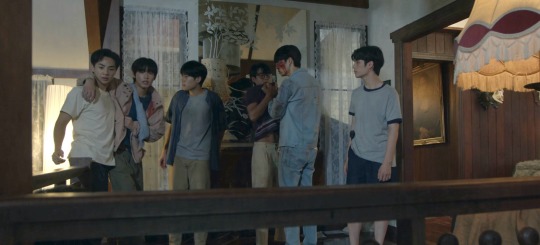
Human Nature According to Hobbes
In Hobbes' 'Leviathan', he delves into understanding human nature. His conclusion is probably best summarized by his most known phrase, "'the state of nature." In this state of nature, where Hobbes hypothesized about a life where there is no government, no laws, or state of order, just simply individuals that are able to live without constraints. Hobbes found that life would be "solitary, poor, nasty, short, and brutish."
Hobbes' comes to the conclusion, that absence of societal constraints, humans are driven by desire to secure their own survival and fulfill their desires. Hobbes states that there is an universal, fundamental drive for self-preservation that leads to a state of equality among humans. Yey, instead of being able to live in harmony, the equality, particularly in vulnerability to harm and death, breeds competition since it is human nature to scrounge, secure, and vie for resources— even when it means taking advantage of one another.
Central to Hobbes' theory of human nature is fear—fear of others, fear of harm and fear of uncertainty. Without structure, humans are trapped in a perpetual state of insecurity, creating a 'war of all against all'. Hobbes acknowledges that individuals have natural rights, particularly the right to self-preservation but with a lack of governing authority, the enforcement to this right is essentially meaningless.
Tldr; there are four main components to human nature: self-preservation, fear and insecurity, equality and competition, and natural rights.
Theory of Class Wars
Now, enter Karl Marx and Friedrich Engels and we have the theory that a society is divided into two classes: the bourgeoisie and the proletariats. The bourgeoisie, own the means of production and are able to explore the labor of the proletariat for profit, which ends up leading to human alienation and inequality.
When it comes to the relationship of selfish desires and class war, at its core, the idea instills that a capitalist system incentivizes and rewards the selfish pursuits among the bourgeoisie. The accumulation of wealth and exploitation of labor and the quest for profit are the driving forces between constructing and maintaining class inequalities.
Dead Friends Forever: The Intersection of Social Class Divide and Selfish Desires
The thing about Dead Friend Forever is that there is a visible class division between Por and Non, which drowns out the undercurrent class differences between the rest of the DFF gang.
Por: He is born into power and higher class. His mother ever states "Do you think I'll be in trouble for kind of thing?" He is born into awareness of his status and the privilege.
Jin: Just from the house that he lives, you can tell that he is relatively well off. The finishes in the house both interior and the exterior show that his family, while not as rich as Por, are likely more than financially stable.
Phee: His dad is a police inspector, which likely provides decent money, as he is able to send his son to a private school on a single household income.
Fluke: We're given enough information that we know he wants to be a doctor and make his mom proud, he's attending tutoring classes and there's no mention of money issues.
Top: No mention of struggling for money, can safely assume that he lives comfortably.
Tee: Struggling, has a lot of debts to Uncle Joe in order to keep his dad alive.
New/Non: Their whole family is struggling even before Non went missing. What little money they had was sent over to New, even taking on debts to be able to provide for him abroad. They were one paycheck away from losing everything, which they eventually did.
Non and the THC Gang
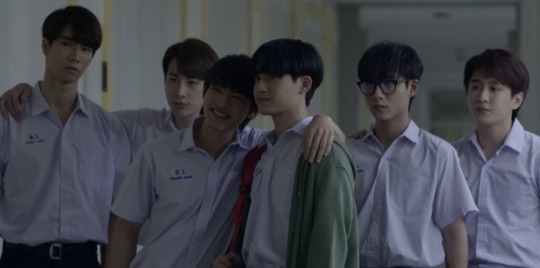
Aside from Tee, the main group are all born into various levels of wealth and privilege, whether it be purely monetary or with the jobs of their parents, so they're able to navigate their life with an air of entitlement. Their desires are all shaped by the comforts and opportunities that their status affords them. Por's family alone was able to get their high school film reported on and with a viewing, merely with the mother's flippant mention of the project. Not to mention that Por's mother explicitly sets the tone of how she would be treated compared to Non's mom. It's a stark contrast, Non stands out as the outsider, not only due to his lack of friends in the school, but also marginalized by his lack of wealth and social standing in comparison to the rest of the gang. And in an odd way, it's likely why he felt a certain degree of kinship with Tee, who is the only other individual visibly struggling to survive, even if he mostly keeps his money troubles away from his group of friends.
The whole reason Non even gets involved with the group is because the group, particularly Por and Fluke, are driven by their hunger for success and recognition. Por likely wanted his parents to find some pride in him and Fluke needs it to round out his resume when applying to medical school. They desperately want to win the sponsorship, so they need and use Non— not as an equal but as a means to an end. They exploit his talent in scriptwriting and they use him as a pawn, not even inviting him to the presentation when its Non's script their using. Hell, they barely could stand being close enough to take a picture with Non. They quite literally use him as a pawn, an easy exploit, reminiscent of Hobbes' notion of self-interest as a driving force.
As the show continues on, the exploitation of Non takes on darker shades, echoing Hobbes bleak depiction of the state of nature. The initial bullying, that is rooted in class-based prejudices, transforms into a calculated campaign of cruelty. While Tee might be struggling financially, he's actually the true leader of the group. Sure, Por may have the money, but the guys only follow what Tee wants. Top and Tee use Non's marginalization against him, almost as if vultures feeding on the weaker. Top doesn't have to pay for the camera and Tee is able to find Uncle Joe's next victim for the horse accounts, a complete parallel of Hobbes' description of the strong dominating the weak in the absence of a social contract. In doing so Non, the 'marginalized' becomes fodder for the selfish desires of Tee and Top, initiating a chain-reaction event to Non's detriment.

While Por, Tee, and Top have the more obvious benefits with how Non is treated, so does Fluke. Fluke, in the hierarchy of status within the group, is at the bottom rung. With Non there he's able to be treated better and he no longer is the scapegoat. He admits it in this episode. He needed Non to be mistreated, because he feared being targeted by the rest of the THC gang, and having Non around kept everyone else's attention off of him. He was no longer the one being harrassed. He's able to sacrifice Non for his own benefit.
The thing about Fluke is that he doesn't overtly try to harm Non, not in the same way that the others do. No, his covert damage that he causes Non is in his silence. He sees Top destroy the camera, Tee come up with the idea to target Non, he sees Jin film Non and Kru Keng, he even questions Jin's intentions to film, but he's spineless. He cares more for himself, he prioritizes his self-preservation. He maintains the status quo and utilizes Non's weakness so that he isn't the next target.
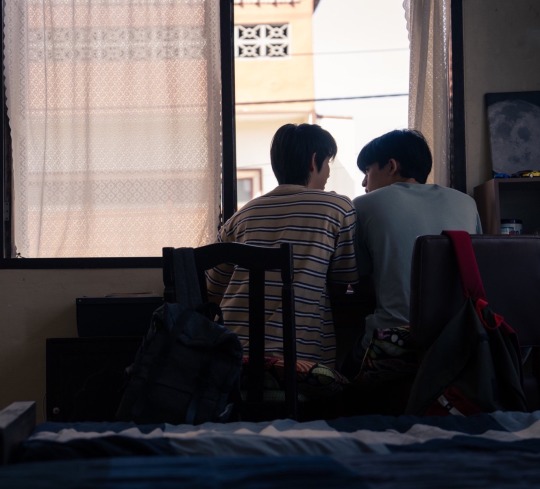
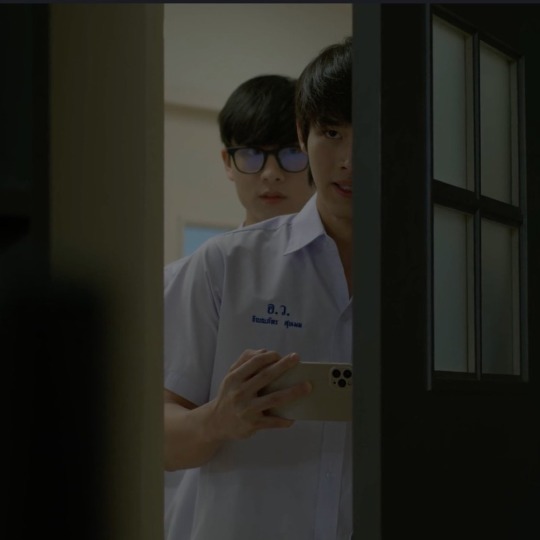
Initially, Jin's treatment of Non seems to defy the expected narrative of class exploitation, since out of the group he's the one that is the most compassionate and understanding. From a Marxist perspective, this initial compassion could be understood as an acknowledgment of the inherent inequalities that exist between the affluent and the marginalized. Jin's actions might suggest a fleeting moment of solidarity, recognizing and acknowledging Non's humanity beyond his status. However, his demeanor shifts dramatically when he realizes that Non doesn't reciprocate his romantic feelings and worsens when he sees him with Kru Keng.
Hobbesian human nature, which is driven by the pursuit of power and self-interest, comes to the forefront as Jin's wounded pride and sense of rejection fuel his actions. In Hobbes' state of nature, individuals are driven by their desires and fears leading to betrayal and conflict. His change in behavior to Non reflects this as he seeks to assert dominance and control in the face of perceived rejection by punishing Non. Jin's betrayal of Non's trust and kindness underscores the harsh realities of class divides, where compassion can quickly give way to exploitation. Hobbes argued that individuals in the state of nature are in constant competition for power and self-preservation, here Jin's realization that Non does not reciprocate his feelings leaves him feeling vulnerable and exposed.
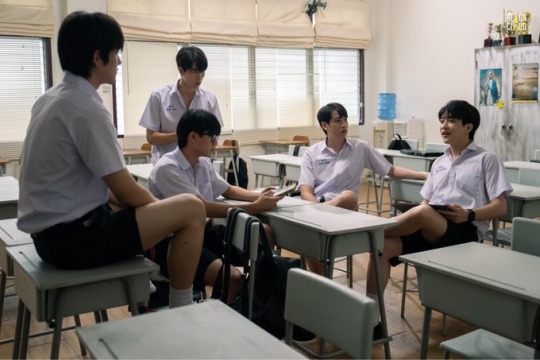
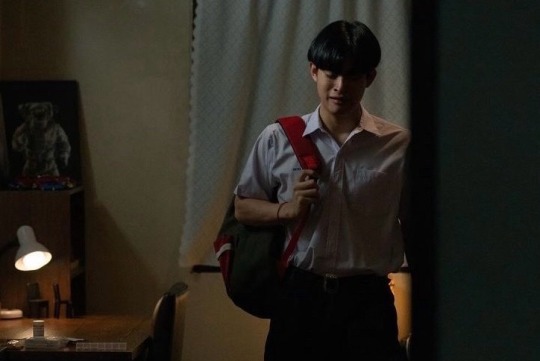
Non's role as a commodity within the framework becomes clear as filming continues. His talent is valued solely for its ability to bring profit and success to the friends. Yet, despite his contributions, Non remains alienated from the fruits of his labor, he's always the worker and never the leader. Continuing this trend of being a pawn in group's quest for recognition. Marx's concept of false consciousness is evident, since Non remains unaware of the true nature of his exploitation until its too late.
The group needs to get rid of Non, because he's become a lose cannon. Tee needs him delivered to his Uncle, so that he can survive and continue to receive the payments he needs to keep his dad alive. The depths of their depravity are laid bare and echoes both Hobbes' and Marx's grim assessments of human nature intertwined with class conflict. Non becomes a victim to their cruelty, to their selfish desires, and the stark reality of coming from a poor family. He disappears into the abyss of the mafia, while the rest of the group continue to live their lives unperturbed, shielded by their wealth and privilege.
Interestingly enough, every single one of the guys that come from a better socio-economic status have begged for Non's forgiveness while under the influence of New's hallucinogens. The only one who doesn't is Tee. Yes, he is under the distress of confessing his crimes since Fluke is holding White hostage, but he's the only one that is willing to admit fault and ask for forgiveness without having to hallucinate Non's face or his voice. All this leaves me asking, what depths of betrayal and exploitation were the THC gang willing to sink to in their quest for dominance? Did Tee's penance begin when attempted to help Non escape his Uncle Joe? Was Non actually able to escape or had they sent him to his death?
2. Phee and New/Tan


Even through Phee and New, we can see Hobbesian and Marxist themes in their different versions of grief they experience over Non's disappearance.
New embodies the the essence of Hobbesian human nature, bringing around the idea of 'war of all against all'. His relentless pursuit of revenge becomes a primal instinct for survival, since he has lost everything good in his life. His brother, his childhood home, his education, his mother, and finally his father, in that very order, over the span of three years. New's grief over the disappearance of Non becomes a consuming force that propels him into a world of darkness. In Hobbes' state of nature, individuals are typically driven by self-interest and the pursuit of power, which New's quest of revenge reflects this fundamental aspect. His quest against the friends responsible isn't solely about revenge, but it's a desperate attempt to assert agency and justice in a world that has denied his family both.
Marx argues that in a capitalist society, the bourgeoisie will exploit the proletariat for profit, perpetuating class struggles. Non was exploited for his script, but New represents the proletariat, the oppressed working class fighting back against the forces of oppression. His revenge is a revolt against the oppressive structures of class inequality that have marginalized his whole family. In Marxist terms, his journey is a symbol of the proletariat struggle against exploitation and injustice, which echos the revolutionist spirit of Marxism.
On the other hand, Phee, who is financially well-off and still has his father, represents the privilege and the detachment from the struggles of the proletariat. He never fully understood why Non wasn't receptive to his help, similarly he's not completely understanding New's own thirst for revenge. While Phee is initially driven by a desire to uncover the truth about Non's disappearance, and while he still loves Non, it's mostly driven by guilt and grief within the context of privilege. Phee has things, people, in his life that still matter outside of Non. Yes, he loved Non, but he's able to move on from his grief, reflecting the detachment and apathy that can settle in with privilege. Under Marx's critique of the bourgeoisie, who exploit the proletarian, it's because Phee still has his Dad and other things he loves in life that he is able to move on from the type of anger in grief that New finds himself overwhelmed in.
It's going to be interesting where Phee and New's friendships heads in the last two episodes. Will it New and Phee collide in a violent confrontation that mirrors the clash between the oppressed and the privileged? Is DFF trying to make a comment on the class war where New's relentless pursuit of revenge against the THC gang represents the proletariat's revolt against exploitation, while Phee's detachment echoes the bourgeoisie's indifference to the plight of the marginalized? Or it will show that Phee and New are able to put their social status aside in order to find revenge against the true bourgeoisies, in this case the THC gang, that exploited Non for all his worth until ultimately destroying him.
Final Thoughts
While this episode may feel significantly weaker in comparison to the last five, I think it's providing us with the necessary exposition as we head into our final two episodes. We're seeing the destruction of the 'bourgeoisie' by their own hands with just a little nudge from the sole proletariat. As Hobbes would likely agree, it's a dog eat dog world in that cabin. It always had been with Top, Por, Tee, Fluke and Jin. There was an equality between them, but now with an outside force, their bonds are breaking and they are willing to kill each other just to survive.
Dead Friend Forever is going beyond the standard slasher genre, even beyond horror. I truly think it's making social commentary regarding the classes and human nature. It's going to be interesting to see who comes out the survivor of this party from hell, if there is anyone.
Tagging @slayerkitty for DFF's meta round up.
#dead friend forever#dead friend forever meta#dff meta#dff the series#thai bl#thai bl meta#dff non#dff phee#dff jin#dff new#dff tan#dff fluke#dff top#dff tee#barcode tinnasit#mio athens#ta nannakun#copper phuriwat#bump pawat#jet bundit#jjay patiphan#us nititorn#be on cloud#boc meta
111 notes
·
View notes
Text
NATLA Debrief: Episode 3 (by yours truly)
Hi again! If any of ya'll are interested here's episodes 1 and 2. Thank you to those who have been following these deranged, unorganized posts, especially @phoebester (Just an fyi this will be hella long, just like the other two)
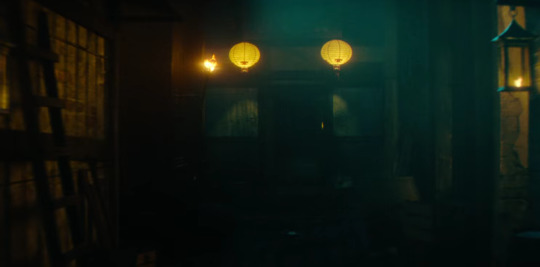
First of all, the way they framed the opening resistence scene was genuinely so cool because I immediately thought back to the cold open for the first episode. The streets are so similar that's where my mind went RIGHT AWAY and if that is not good set design and filming I don't know what is.
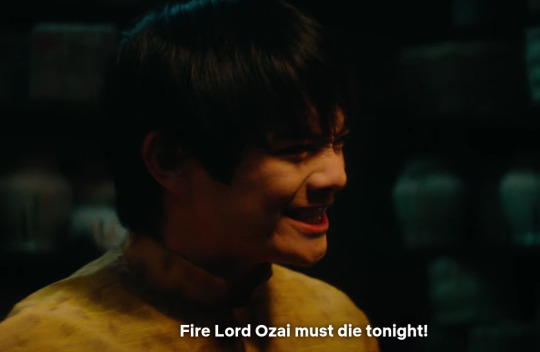
The resistance scene was so powerful for so many reasons besides those small details, too. The concept of a resistance within the FN was never addressed at all within the cartoon and I can't express how glad I am that they added this. It just makes logical sense that some people would resist, especially while so many are dying in war, and it really serves to humanize the FN people in a way that's reminiscent of book 3 ATLA. Perfect way to expand on the source material and introduce core themes earlier in the show (M Nite should be taking notes).
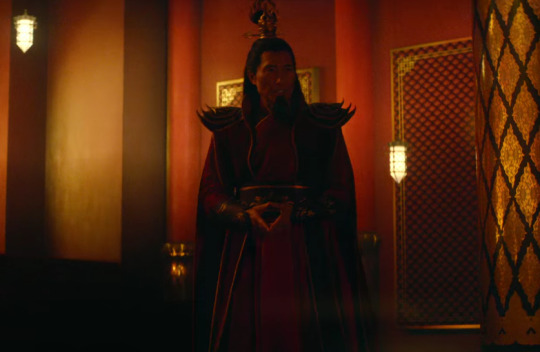
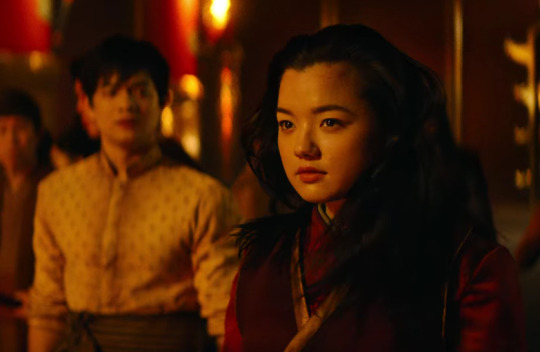
It was also a perfect way to introduce both Ozai and Azula's characters. Ozai is this menacing figure stepping out of the shadows (quite literally), an almost larger than life villain who seems to have every move planned and everything calculated. He's brutal and efficient and we can see that. Azula is conniving and smart, the kind of girl who can fool anyone and come out on top, but is ultimately still a weapon under her father's control. You can tell from the moment Ozai mentions Zuko that she is the underdog, but she is determined that it will not stay that way, and she seems just terrifying enough to succeed. (also idc what anyone says Elizabeth Yu has mastered Azula's look and general vibe. I feel like the whole 'miscasting' debacle was a mix of fatphobia and being shown the wrong stills before the show came out. She looked sort of sweet and innocent in those but I get absolutely none of that from this scene)
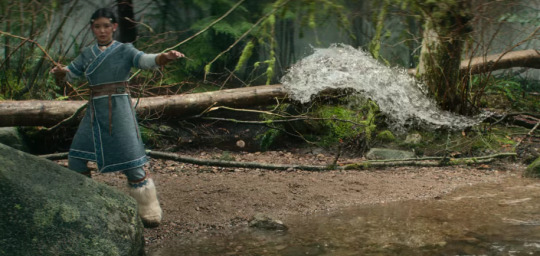
Ugh the exposition was great and then they have to give us this. What the absolute hell did they do to my Katara? Like there was a whole ass episode in the cartoon devoted to her getting mad because she wasn't progressing as fast as Aang and then in this fucking adaptation the maddest she sounds is when she emotionlessly declares, "I don't get it" to convey mild frustration. I'm sorry Kiawentiio, you're acting is great but the writers clearly have no fucking idea how to put your emotional range to good use. The same problem was present in the last episode and I just don't see them being able to fix it significantly enough at this point, even if they have a desire to. Not to undermine that, but there were a couple good points in this scene: Aang mentions something about bending being "beyond thought" which gives bending a more spiritual aspect that I like, and Katara's PTSD is brought up again in an intelligent way, but still, that doesn't matter if they're going to completely butcher her character. (side note: when is Aang going to learn waterbending? they haven't shown him training at all and I'm getting worried)
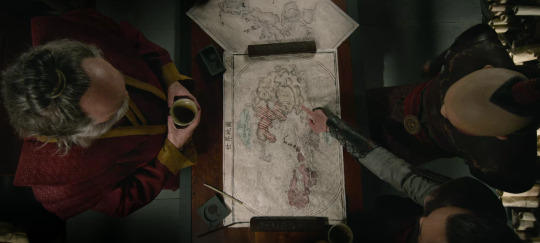
This scene was fine or whatever but what in the absolute fuck is going on with Zuko and Zhao? Are they not going to do the agni kai? Like I know there's still animosity there but they were really just sitting there (semi)-calmly enjoying a cup of tea and demonstrating only mild dislike for each other. All I have to say is if they remove the agni kai altogether I'm gonna be so fucking pissed it'll bug me forever and I'll be fucking insufferable.
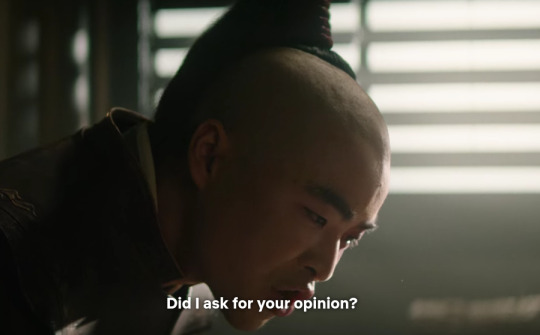
Also Zuko is so mean to Luitenient Jee for no reason. I know it's because his abuse makes him see any kind of comradery as weakness so it's a good detail if that's what they're going for but ngl I also find it a bit funny. Like what did he ever do to you? And Zhao taking three tries to pass his officer exam is so perfect too like what a fucking looser lmao.
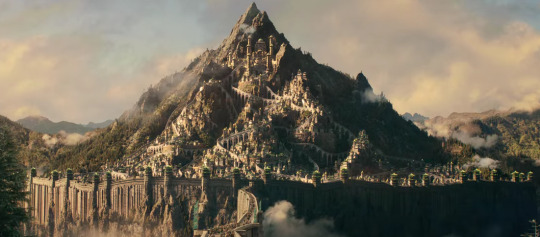
Ba Sing Se looks beautiful. There's something so mystical about it, especially in the way Aang describes it as they walk up to the gate. It's this hub of culture and science and art, but it's also incredibly militaristic and so changed due to war it's almost unrecognizable to someone who was there a hundred years ago. The adaptation of cultures during times of change is something ATLA does so well and I'm glad to see that it's continuing in the LA.
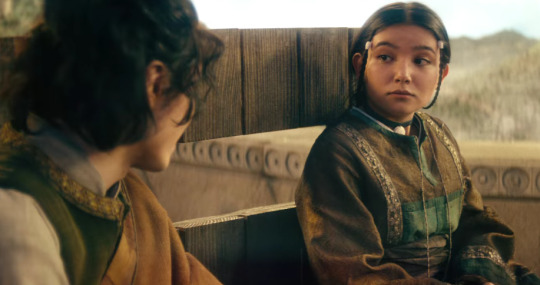
AHH Katara was so awkward during this whole scene and I loved it. For one thing Sokka's commentary was absolutely hilarious but it's also this reminder that Katara has been relatively isolated from other children her age and her brain is like "cute boy flirt how" and its so fucking funny. It might not be the same Katara as the cartoon who is effortlessly comfortable wherever she goes but this is so much more realistic and if she's going to be a bit different this is probably the best thing for them to change (now keep the awkwardness and give her back her anger Netflix I'm begging you)
I am slightly concerned because it looks to me like they're trying to condense at least four episodes into one and I'm not sure if that's going to be a cohesive plotline or a complete mess or not but if handled carefully I think they might be able to pull it off.
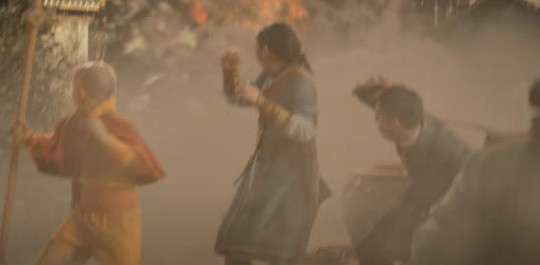
Ooooh the explosion was super unexpected and totally cray cray thanks for keeping me on my toes. I'm assuming it was Jet that planted the bomb although I cannot for the life of me think why. Anyways Teo was adorable I'm adopting him.
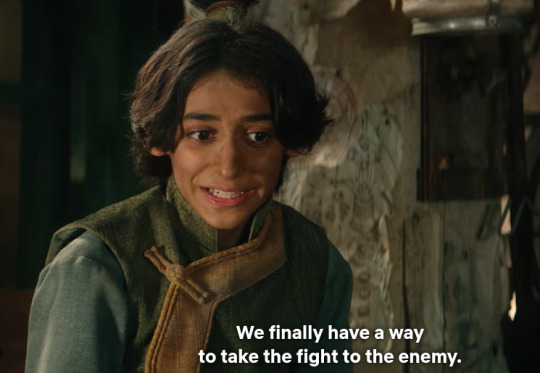
Also I am so so so happy that they gave him a little more depth beyond just 'happy glider kid' and gave a bit more nuance to his character. Of COURSE kids who grew up in war are going to be desensitized to the bloodshed OF COURSE they're going to be a little vengeful and be thinking about ways to win the war OF COURSE Aang is going to be uncomfortable with that because he didn't grow up with that militaristic mindset even if he did loose everything OF COURSE that's not going to change the fact that kids grow up hearing about death and experiencing loss as extremely young children versus Aang being suddenly thrust into this responsibility and grief because he didn't grow up like that he grew up in peacetime it just makes sense. Good job Netflix this was wonderful this was perfect I loved it.
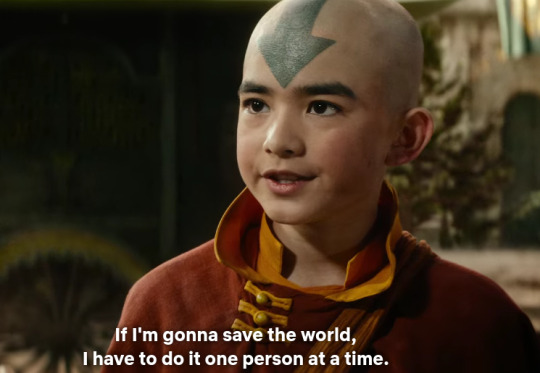
Okay don't get me wrong I love the way Aang wears his heart on his sleeve I love how their in-the-face storytelling makes a bit more sense with how open and emotional of a person he is it's just part of his character that was improved upon by the LA in my opinion but this is also just... such a misunderstanding of the group dynamic. Like why isn't Katara seeing these people and thinking "I can help with this I have to help with this" and Aang giving this speech to Sokka jumping on the bandwagon? I would even accept them seeing the destruction together and mutually deciding that they need to help the people there (this would probably be best as it allows us to see both character's compassion) or Aang saying something about it and Katara immediately being like "ur absolutely right" but of course they can't do that all we need is a lengthy speech from the protagonist while Katara stands there like robot girl. My mistake.
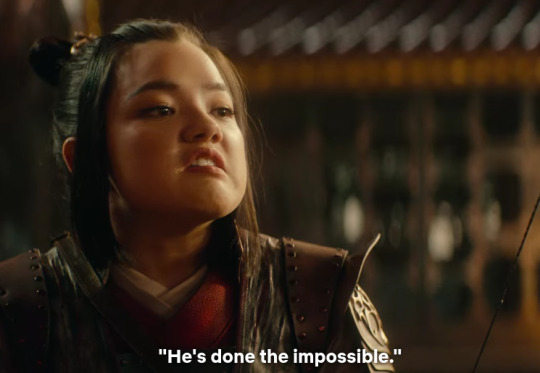
STOP because her mocking face is so fucking perfect I love Elizabeth Yu she's perfect. Anyway, I think that they're kind of... adjusting her trauma a bit? I mentioned earlier how I feel like she's shown as a little more scrappy and an underdog as opposed to perfectly calculating and not a hair out of place, but after this scene I feel the need to expand on that. In the cartoon, Azula's abuse from her father centers around his unattainably high expectations for her that eventually cause her ultimate breakdown and the conclusion to her devastating character arc. But in the LA, they're portraying her as less of a prodigy and more of a hard worker. She still has incredibly high expectations, but in this version, she never meets them all the time. Her brother is almost leveraged against her in a way. Even if she feels like she is the best and has the constant need to prove she is the best to her father, there's always going to be this nagging insecurity that she won't be good enough to measure up to her brother. She's not being told she's worthless like Zuko, but she's not reaching every goal like cartoon Azula, either. This also might explain why she has arrows. In the cartoon, weapons are viewed with disdain by firebenders, making Zuko using them so controversial, but Azula definetely doesn't seem to be hiding her talent for the bow and arrow and even if it was a her-sneaking-away-to-practice sort of situation that's not very in character and I don't think she would do that. I think in this version she probably has them because she's trying to find every possible way to prove herself to her father beyond just firebending, and mastering a weapon is a way to do that. I'm not sure how I feel about these changes but she is clearly a different character in this version than in the cartoon and moving forward I'm going to treat her as such. (I've noticed this a bit with all of the characters except possibly Sokka: they're different people. I think this actually might be intentional. [even so I still don't like their characterization of Katara her trauma hasn't changed very much to my knowledge she should still have the same core drives and character traits])
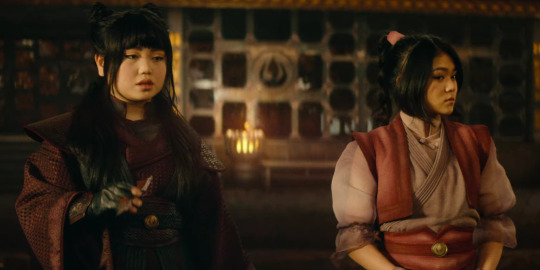
As well done as Azula was, there was relatively nothing in the Ty Lee and Mai department. They're just kind of existing, watching her train. Ty Lee is vaguely cheerful (and her costume is great btw) and Mai has one line about exploring the world that gives a bit of insight into her character and has a monotone voice. They're both clearly a little scared of Azula but that's basically it. Hopefully we get more on them soon.
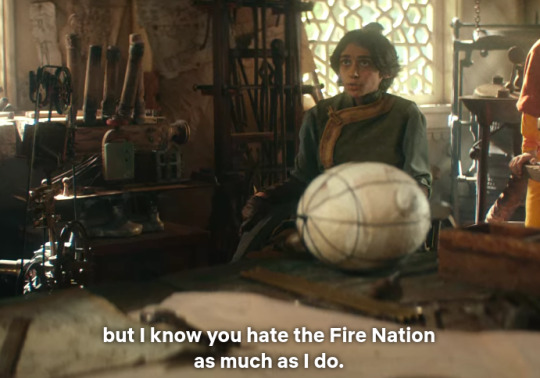
Back in Ba Sing Se, I noticed a bit of a parallel between Teo and Katara. The Mechanist mentions that they lost his mother due to the war, which reminded me specifically of Katara. Throughout this scene, we see that Teo remembers his mother's philosophy and adopts it into his own mindset far more than his father's. Their situation is different because while Katara is arguing for compassion Teo is arguing for fighting back, but they are both fundamentally saying the same thing. It's not enough just to accept their lot in life and try to survive or fight, it's about the big picture, and about defending the things they love. While Katara and Teo both approach this subject from a very different front, the core idea is the same. It's also telling how they are dismissed initially as idealistic for their values when they are really upholding what their mothers stood for in their eyes: for Teo, a symbol of hope in her retellings of the stories of the avatar, and for Katara, a symbol of kindness in her reminders to remain empathetic despite the horrors of war. Make of this what you will, I just thought it was a nice little parallel.
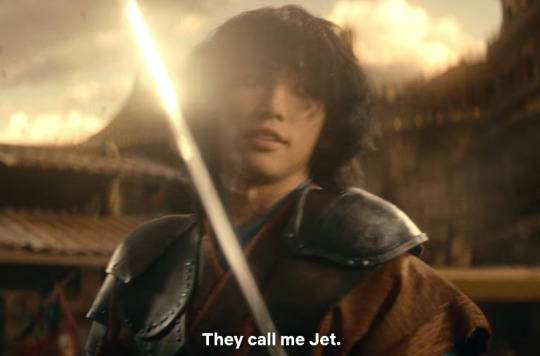
Anyway, allow me to have a few words on the whole Jet thing (in bullet points because I don't have enough brain power to do this)
I'm glad Jet got his freedom fighters outfit. I was a bit worried when I saw what he was wearing in the first scene he was in because the fit is iconic, and so are the swords
God he's so fucking dramatic "they call me Jet" while the sun glints off his swords and he turns slightly for affect it was so funny I laughed out loud
He and Kia have no on-screen chemistry I'm sorry. Like even the fight scene was so awkward and every time they speak to each other they sound so stiff. They're good actors independently but whoever was watching their chemistry check (I'm assuming they had one pre-production but judging by this crap I wouldn't be surprised if they didn't) was either asleep or it was their first day because there is NOTHING there
What the hell did they do to the Freedom Fighters? They're so cheesy and the costumes are so bad (especially Smellerbee's). Like seriously that entire fight scene was so awkward idk what the hell happened there but it was nowhere near the quality of the rest of the episode so far
Overall, I'm not a huge fan. Also where is Sokka I'm pretty sure he's supposed to be there somewhere
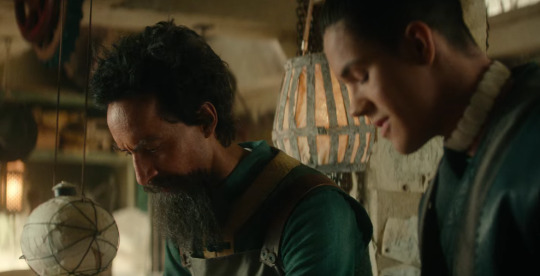
Okay here's Sokka finally. Are they just taking him out of the Jet shenanigans entirely? I wouldn't be surprised considering how many episodes they had to condense but still I would have liked to see that. Oh well, I guess they had to have Katara do something in this episode instead of just stand around while her brother and Aang have huge plot points. Anyway, this scene was very interesting to me. Sokka and the Mechanist bonded in the og but not to this extent, and I honestly liked that they did something a bit deeper with it considering they don't have as much screentime to establish Sokka's daddy issues (for lack of a better word). Anywho the Mechanist mentioning that there are other career paths to take besides just being a warrior was super cool and I think we can glean a lot from it about Sokka's future character arc. Maybe in this version he doesn't perfectly live up to his dad's expectations and instead finds his own way? It was nice to see Hakoda proud of him in the original but if they go down this path I definitely won't be mad. It's interesting while staying true to the character, it's just a different direction.
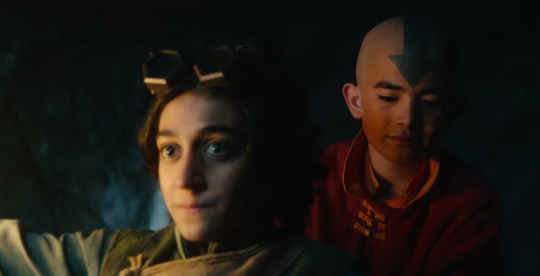
The scene with Aang and Teo was cute. They're both good actors who play off of each other nicely, and Teo talking about how he doesn't want to follow in his father's footsteps lends a bit of insight to the conversation the Mechanist had with Sokka. He probably mentioned Sokka's dad because he wondered if his parents were engineers too and maybe is looking for a bit of an apprentice since his son doesn't take after him as much. This is also another way Teo conflicts with the Mechanist's way of life and may be more similar to his mother.
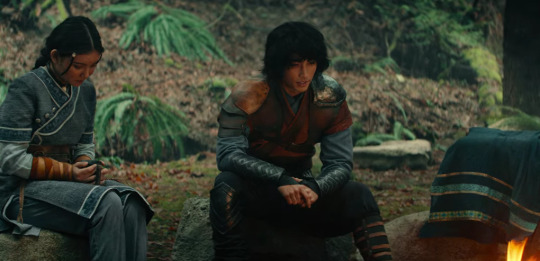
The jetara scenes at the Freedom Fighter camp had a much better dynamic. I think the fight scene was probably just them figuring each other out as actors, it just sucks that it seeped into the final take. I confess I was a bit disappointed that the Freedom Fighters didn't live up in the trees, but I guess that would be a bit difficult to engineer. I also noticed how Jet repeated Teo's "if not us, then who?" statement, which is probably just your basic commentary on how the future generations are our hope blah blah blah. It's a major theme so I shouldn't be as disinterested as I am in it but as it stands I'm still not totally thrilled with the Jet plotline as a whole and I think that may be affecting it. I feel like Sokka should be here to add some variety and spice things up a bit it's kind of boring.
The last jetara scene was definitely the best yet. I can't get over how happy I was to hear Jet say his mother taught him to fight. So often we hear how dads or older brothers are teaching the women in their family to fight but here we have a canonically badass male character saying that an older female relative was the one who taught him. One of the major complaints I have from the cartoon was how for all its talk about women being able to fight and its supposed feminist message, there were no women of the older generation fighting at all except for Jun, who wasn't even a particularly moral character like all these older men. We do have to remember that the cartoon started production over twenty years ago so it is a product of its time, when feminist issues weren't very mainstream. Another factor that might have contributed to the lack of feminism in the original was the generational discrepancies; millennials were the first to have widely accepted equal educational opportunities in the US, and even though educational opportunities are still affected by sexism, college became the norm for both male and female students at that time. This isn't to say women older than millennials didn't go to college, but this is around the time women and men started to become relatively equal as of percentage seeking higher education. Basically, they were the first generation of women expected to have careers, and therefore the writer's minds were probably shaped alongside a similar number of female peers, but primarily by men. This could have contributed to the lack of older women, but as times changed, so to did the amount of older women in professional fields. This line is a reflection of that, and I hope we continue to see more badass older women and older warrior women and women in power as the LA continues.
Other than that, I did take my shipping goggles out during this scene at the "sunrise" bit, and it wasn't about jetara. I heard from other fans in the zutara tag that the "you rise with the moon, I rise with the sun" line was removed but I keep thinking about how Katara is legitimately drawing power from remembering the sun rising, a time when the opposite element, Zuko's element, becomes more powerful. I know I'm reaching, but while I mourn the loss of our beloved "you rise with the moon, I rise with the sun" I have to find a new version. Anyway I think we should call this sunrisegate lol
Also, the way Katara is extremely hesitant to talk about her trauma whereas Jet seems completely fine with being emotional and dumping out exactly what he was feeling may have been a device but it does remind me of something I read about how ppl with PTSD will often react very differently when sharing their trauma and the same is true for many other trauma induced disorders. It was probably unintentional but I still thought it was a nice detail.
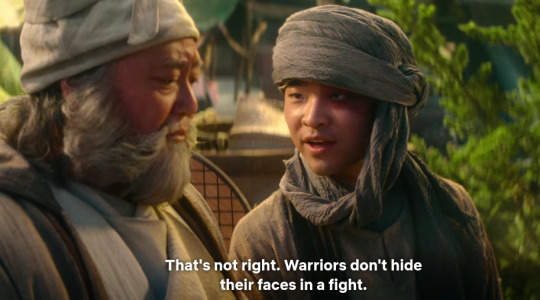
Anyway on a less serious note Iroh and Zuko's dynamic is still top tier. I've seen a lot of people complaining about Iroh's character but I don't see anything wrong up to this point. I might be in for a shock in future episodes but I have genuinely no idea what they find so off putting. He's a great actor and the character has legitimately not changed. The line above was a bit undercut by the fact that he's standing in the middle of an enemy city with a cloth half wrapped around his face to keep part of his face from being seen, but I'm just gonna take it at face value (haha pun). I think the thing Zuko despises most is cowardice, and it affects his perception of the war in a huge way. He calls Aang a coward for escaping from prison because he was running away or whatever and I've never considered Zuko a particularly logical character but it's like... bruh he's outnumbered like fifty to one what he is gonna do? Anyway his definition of cowardice is directly tied to his honor and his perception of it in relation to his trauma and the way he held back in the agni kai and him perceiving that as cowardice maybe... Ya'll got me? This isn't fully formed because I obviously haven't seen this new rendition of the agni kai but I'm guessing the events are basically the same. Do with it what you will.
I skipped over the Azula and Zhao scene because I don't have any groundbreaking commentary except to say that I liked it. It ties Azula into the story nicely and gives Zhao something actually interesting about him (I don't hate him as much as I did in the cartoon so whenever he comes up on screen I just sort of yawn).
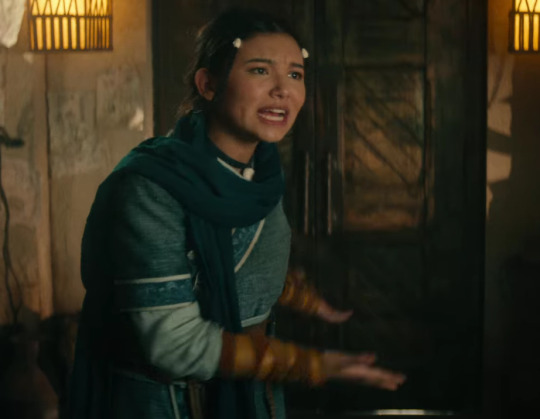
Anyway, it was nice to see Katara get a bit angry. I think this captured the gaang dynamic pretty well. Aang being relatively neutral/ quiet while the siblings argue and Katara gets twice as mad as Sokka. Also he may have had the last word but she had the last laugh:
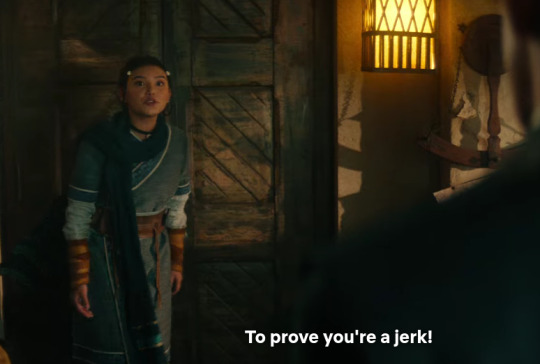
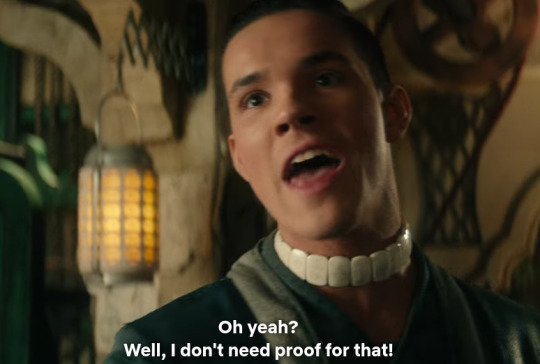
Again, the sibling dynamic was really great but I didn't feel like Katara was carrying it as much as in previous episodes. Sokka actually played his part in making it interesting and realistic. I don't think this single argument is enough to redeem Katara's characterization in my eyes but at least we know now there is a little spark there.
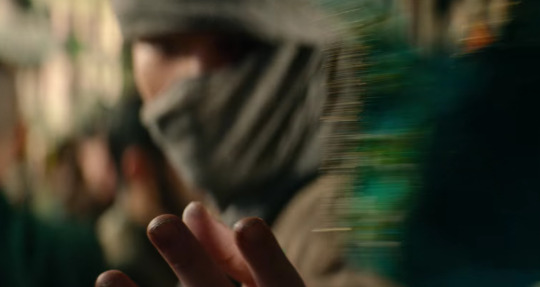
AHH THE SCARF SCENE! Scarfgate was everything I could have asked for and more. Like why does he appear directly behind her like that unless he's trying to fight her? Why does he just let her go by like that? Why does he hold out his hand in the first place? Truly is the Watergate of our time it deserves that name. (also in the same episode as the whole sunrise thing? come on) I'm probably being baited but at least I'm enjoying it.
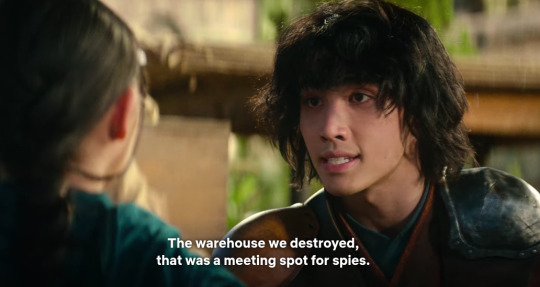
So I was right about the bombings! I can't believe all those cute little kids are terrorists but I couldn't believe it in the cartoon either so I guess that checks out. Either way I find the bombing far less forgivable than trying to take out the Mechanist. Innocent civilians were hurt and even though I know there was a real possibility that civilians could have been hurt in the attempted bombing for whatever reason it just seems... more brutal somehow. Like the first one was in the center of town, you know? Anyway terrorism is wrong I hope Jet finds his way.
(I was worried about how they were going to tie all the seemingly unrelated plotlines together but I think they pulled it off. Again my main problems were all concentrated around the Jet plotline but when the Mechanist was tied in it became a lot more interesting)
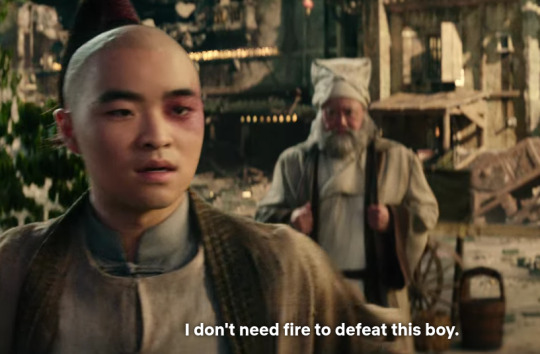
When I heard this I was like "son ur about to get ur ass kicked" but the funny part is he was kind of right. Like when neither of them were bending he was winning. I guess in all fairness he is a lot bigger than Aang but I don't feel like that was an accidental detail. Anyway, I think this fight scene was the most entertaining yet and so much better than jetara against the firebenders earlier. Maybe the affects for water are just worse than air and fire (it feels slower somehow) but I'm very partial to this fight. And that's saying something because I usually fast-forward through fight scenes or just kind of tune them out or barely watch, so you know it was really good.
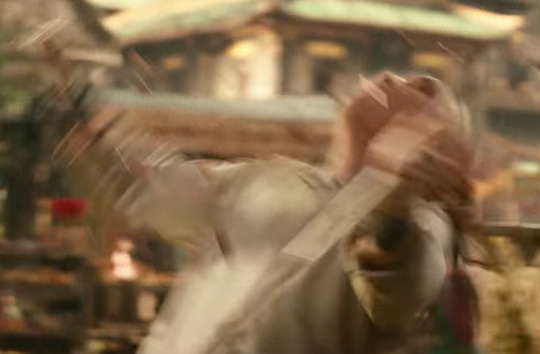
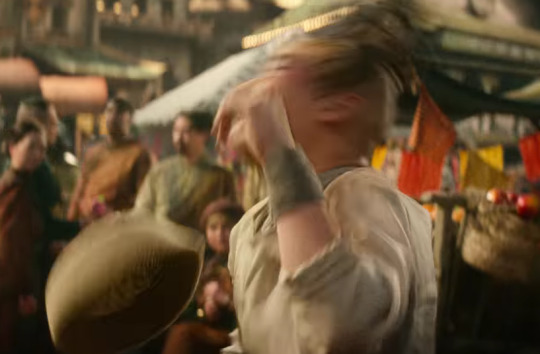
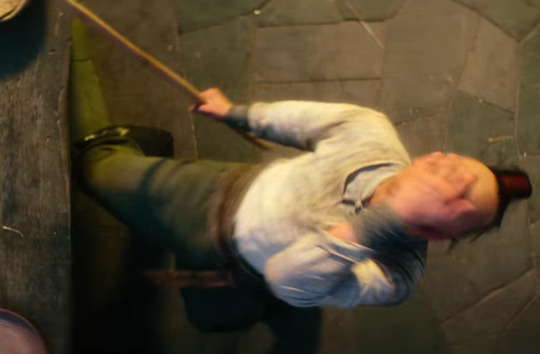
I think the reason I liked it so much was that it was funny, honestly, not in the same way or to the same degree the cartoon was but I laughed out loud a couple times. For instance Zuko gets hit in the face three times in the span of ten seconds, once with a plate, once with a wicker basket, and once with his own little stick thing. Aang also put a basket over his head and some random ass lady started whacking him with a fan. Kudos to whoever choreographed that it was the best.
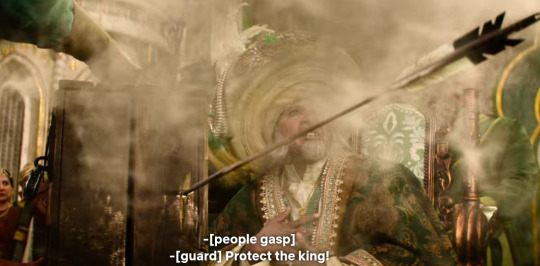
Also I liked how Sokka and Katara saved the day together. Cute sibling bonding excersize. And it ended on a cliffhanger with the characters separated! My favorite kind of cliffhanger! It definitely left me wanting more.
Anyway, to recap, things I didn't like:
No Zuko and Zhao agni kai
Mai and Ty Lee were just sort of there
Katara's characterization is still so-so
Jetara plot line was boring and chemistry was not the best
It was kind of a lot for one episode, even if they managed to do it well
Things I did like:
Opening scene
Azula characterization
Teo
The Mechanist plotline
Teo and Katara parallel
Katara DID actually seem a little bit more firey in this episode
SCARFGATE
Zuko and Aang fight scene
Surprisingly good handling of all those loose ends
Cliffhanger
Overall, I would give it a 9/10. That's the highest score I've given an episode so far and I'm standing by it. I know others might have a very different opinion on it since it was condensed so much and differed a lot from the cartoon, but I agreed with many of the changes they made. One thing I would urge everyone to remember is that these are different characters from the cartoon. They're going to act slightly different and have slightly different journys and that's okay. I think it is worth comparing to the original, as it is an adaptation, but we need to remember that an adaptation is not an exact replica, nor should it be. That in no way means that we should make allowances for anything we found negative or mediocre, but it is going to be different and change in it of itself isn't a bad thing. Anyway thank you guys so much for sticking with me! I'll probably have the next episode's debrief up by tomorrow.
#natla debrief#emmie babbles#scarfgate#zutara#aang#sokka#katara#zuko#jet#jetara#natla episode 3#natla analysis#natla meta
55 notes
·
View notes
Text
My DFF Theory:
Phee and Tan are in it together, and they are fucking with legitimately supernatural forces.
Deets under the cut:
Phee is obviously guilty over saying what he did to Non after catching him seeking comfort in the arms of a literal groomer. And we don't yet know if they spoke again after that or before whatever tragic roofie bullshit is about to happen to Non. That being said, Tan is also new to the group. He "joined them later" just like Phee, after Non had already disappeared, but has no romantic attachments (unlike White).
Personally, I think Tan may be Non's mysterious older brother, New (not all older siblings have to be taller than you, as the shortest and oldest kid in my family).

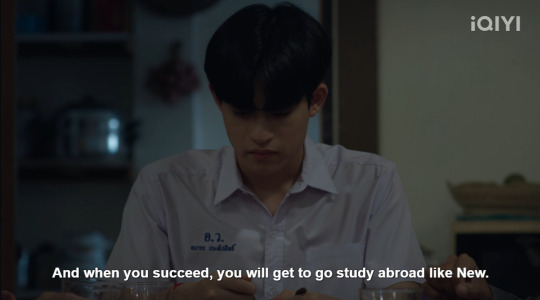
Especially since he has zero qualms asking about Non despite how squirmy and uncomfortable the others get.
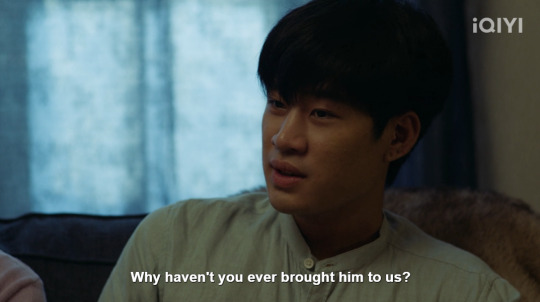
He's also in close proximity with Phee during most larger group shots.
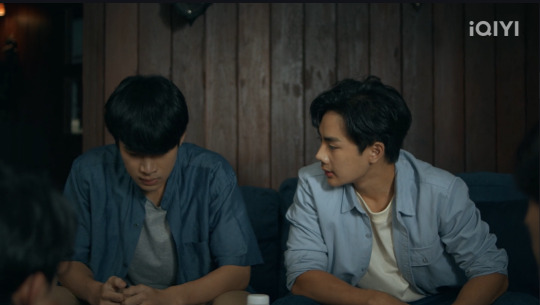
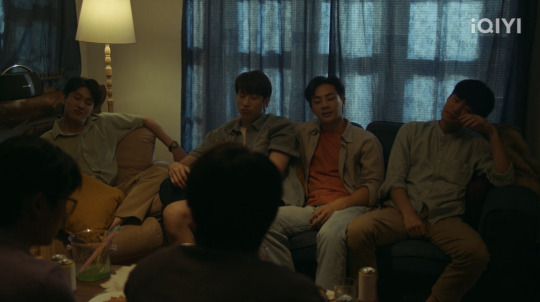
At first I thought they might've been rotating who was under the Janta mask/taking turns harassing the group at large or doing their spooky window peeping. But after the bathroom incidents with White and Top, and the rate at which Janta appears/disappears in the woods, I think they may have actually sacrificed Keng in exchange for supernatural help.
I'm not going to go on a tangent about how "Phi" is also the casual term for 'ghost' in Thai folklore, but it's a detail to keep in mind.
Mophi folk priests are also said to work "using trances, sacred objects imbued with supernatural power (or saksit), possessions, and rituals". What's the best way to get your group's most annoying and shitty guy to dress up as the killer and take Por out for good? Or to convince someone that a nearly-dead guy just jumped off the couch and tried to kill them? Trances, baybee!
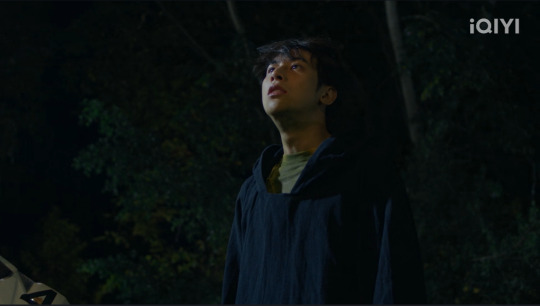
(the Janta costume and setting may also be soft references to Apichatpong Weerasethakul's "Uncle Boonmee Who Can Remember His Past Lives" but I can't say for certain since it's just a passing similarity)
Now you may be asking, "Well what about Phee and Jin?! Phee protects him in the faux-cemetery even though he's a certified weenie nibbler!" Or even, "Hey! Tan and Tee are in the woods together when they see the monster and both of them are scared!"
And my answer is: No duh! You don't want to give away the act by not freaking out when you see the creepy masked figure in the woods. And you certainly don't want to be the only guy who hasn't been harassed. Those would be the two biggest red flags!
Plus, how else are you going to make sure that the guy who posted revenge porn of your boo being groomed on Twitter gets what he deserves? Being at his side and offering comfort only to rip it away at the last second??? Priceless. And well fucking deserved imho.
So yeah, that's my theory so far. Thoughts?
#dead friend forever#dff meta#dead friend forever meta#dff the series#barcode tinnasit#ta nannakun#jj chalach#copper phuriwat#jet jetsadakorn#us nititorn
66 notes
·
View notes
Text
Was anyone going to tell me that up to 50% of twins create their own language as small children but the large majority of them grow out of and forget that language unless they are victims of traumatic experiences like neglect or are not properly socialized with other children?
Or was I supposed to find this out and go insane about Jet and Ruby Rocks again on my own
#like. god I know this wasn’t the intention when Jet and Ruby had twin speak#but from a meta/fanon perspective like#the twins rarely interacted with kids their own age. they were probably raised largely by nurses and nannies.#like. yeah this tracks#cienna talks#acoc
30 notes
·
View notes
Text
I do think there’s an interesting disconnect between how Katara and Sokka on one hand and Jet and his Freedom Fighters view Fire Nation civilians which is best explained by the different policies of imperialism the Fire Nation pursued in the Southern Water Tribe and the Earth Kingdom.
You see, the Fire Nation didn’t see the Southern Water Tribe as occupying desirable economic territory. Their genocidal attacks against the SWT are motivated due to fear of its power and contempt and hatred toward waterbending, but the Fire Nation has no interest in territorially occuppying the Antarctic, made particularly care by the fact they seem to lose most of their interest once the power of the SWT has been “broken.” As a result, there is no policy of occupation or building permanent settlements, while the campaigns themselves are almost solely carried out by uniformed soldiers and sailors. Fire Nation civilians are critical to the campaigns through their support for the war effort, but the SWT victims of the Fire Nation’s raids almost never see them, instead almost solely being exposed to soldiers and sailors. As a result, Katara and Sokka regard Fire Nation soldiers to be intensely threatening, but don’t regard Fire Nation civilians to be threats and are often even sympathetic to them. They make no commentary on the Fire Nation policies of settler-colonialism when they encounter them in the Earth Kingdom.
By contrast, the Fire Nation is intensely interested in the Earth Kingdom’s land and resources. It pursues a policy of settler-colonialism there, aiming to exert imperial control while seizing land and resources. “Civilian” settlers are a tool and weapon of imperial control and domination, critical for establishing power. Thus, Jet and his friends, as victims of settler-colonialism, perceive Fire Nation civilians as intensively threatening and as engaging in acts of aggression through their mere presence.
Thoughts? It all makes me feel like we really needed to have Jet join the Gaang.
#Katara#Sokka#Jet#Jet meta#Sokka meta#Katara meta#fire imperialism#southern water tribe#water siblings#water tribe#Earth Kingdom#settler colonialism#ATLA#Avatar The Last Airbender
389 notes
·
View notes
Text
Jet is not worse than Iroh
Defending Jet feels weird sometimes because I don’t condone what he did but I also really understand how it happened and still consider him a good person.
People can like or dislike any character, but something has always pissed me off with how people talk about Jet and I finally found a coherent way to express it.
Let’s look at Iroh. He fought in the war and killed many people to the point he made himself known across the Earth Kingdom. He was once friends with the Rough Rhinos who were the cause of Jet’s loss. He breached the walls of Ba Sing Se and the only reason why the Fire Nation didn’t succeed then was because Iroh lost his son.
Iroh was an adult. Iroh was a powerful firebender. Iroh had strong political power. Iroh had an army. Iroh could go anywhere he wanted. Iroh lost his son at war as an adult.
Yet the fandom:
praises him
says he’s a great person
even wants him to be Zuko’s father
feels horrible he lost his son
says he felt sorry
doesn’t see a reason why any character should hate him
and will argue it was the propaganda he was fed
Now Jet manipulated the Gaang into flooding a village. We don’t know much about Gaipan beyond that there were soldiers there, but the show didn’t color in the scene of Sokka warning them (wonder why). I think we could assume there were EK civilians there. The only reason why no one died was because the Gaang interfered.
Jet was a child. Jet wasn’t a bender. Jet had other children fighting with him. Jet had nothing to his name. Anywhere Jet did go there were Fire Nation soldiers. Jet lost his parents as a child. Jet lost his home.
Yet the fandom:
demonizes him
calls him a monster
compares him to the Fire Nation
barely acknowledges his trauma
only considers him remotely likeable because he tried to change
or still doesn’t think that’s enough
believes there’s no way Katara could ever forgive him
and will argue he should have seen past his prejudice and trauma
If people look at Jet and condemn him, Iroh should be treated even worse because he was in a much better situation and did worse. He had wealth, he had a nation supporting him, he was an adult.
What did Jet have? Trauma, a home where soldiers are constantly passing through, a bunch of other orphans to take care of, a nation that’s losing more and more, a nation that doesn’t care about orphans, and a mind and body not old enough to deal with it (if you could be old enough to deal with it).
Jet didn’t even kill anyone. Iroh killed hundreds if his title is anything to go by and would have probably won the war had his son not died. Meaning he didn’t stop because he wanted to. He stopped because he was forced to.
Which is the same thing as Jet except every other disadvantage Jet had.
What about Jet is worse than Iroh? What about Jet makes people say he should have seen passed his anger and trauma, but Iroh is excused as a functioning adult? Even people who like Jet act like he’s worse than Iroh or that it will require a lot for him to be accepted by the Gaang.
Oh Iroh was fed propaganda his whole life.
Yeah and Jet was fed death and killing and homelessness and cruelty at least half of his life. I wonder what that does to a person.
Jet didn’t get the opportunity to see the Fire Nation living as regular people, but Iroh sure did with the Earth Kingdom and he still killed them.
Also Jet actually cared about the war and what happened to his people. Iroh did nothing until the very end. He didn’t fight in the Invasion, and he never confronted Ozai.
Jet would never
#I should change the title#Jet is better than Iroh#do people even defend Iroh with propaganda?#I just used that because what else do you have?#honestly I rarely see Iroh fans acknowledge his actions deeply#Jet#atla jet#Jet meta#Jet defense#Iroh critical
166 notes
·
View notes
Video
YT LINK if you’d rather watch it there
https://www.youtube.com/watch?v=nV7BgCrDapo
flight: a kirby fan animation
i felt like showcasing a bunch of a the different copy abilities that enhance kirby's flying abilities, surprised no one's done it yet even. i've had this idea in my head since before forgotten land was released and they since gutted kirby's hovering lmao. also it'd be nice if they made an amazing mirror type game again
all of this is done in adobe animate with a few post-processing effects in adobe after effects
this was done purely out of passion and took a long time to finish. if you liked what you saw and want to see morefeel free to support me on ko-fi and follow me in other places! anything would be greatly appreciated!
kofi: https://ko-fi.com/highzle
twitter: https://twitter.com/highzle
tiktok: https://www.tiktok.com/@highzle
ng: https://highzle.newgrounds.com/
ig: https://www.instagram.com/highzle8/
#kirby#animation#Kirby and the forgotten land#fly#kirby's dream buffet#nintendo#kirby animation#kirby fanart#kirby 30th anniversary#wing kirby#ufo kirby#fighter kirby#cupid kirby#beetle kirby#hi jump kirby#missile kirby#burning kirby#jet kirby#meta knight#king dedede#bandana waddle dee
423 notes
·
View notes
Text
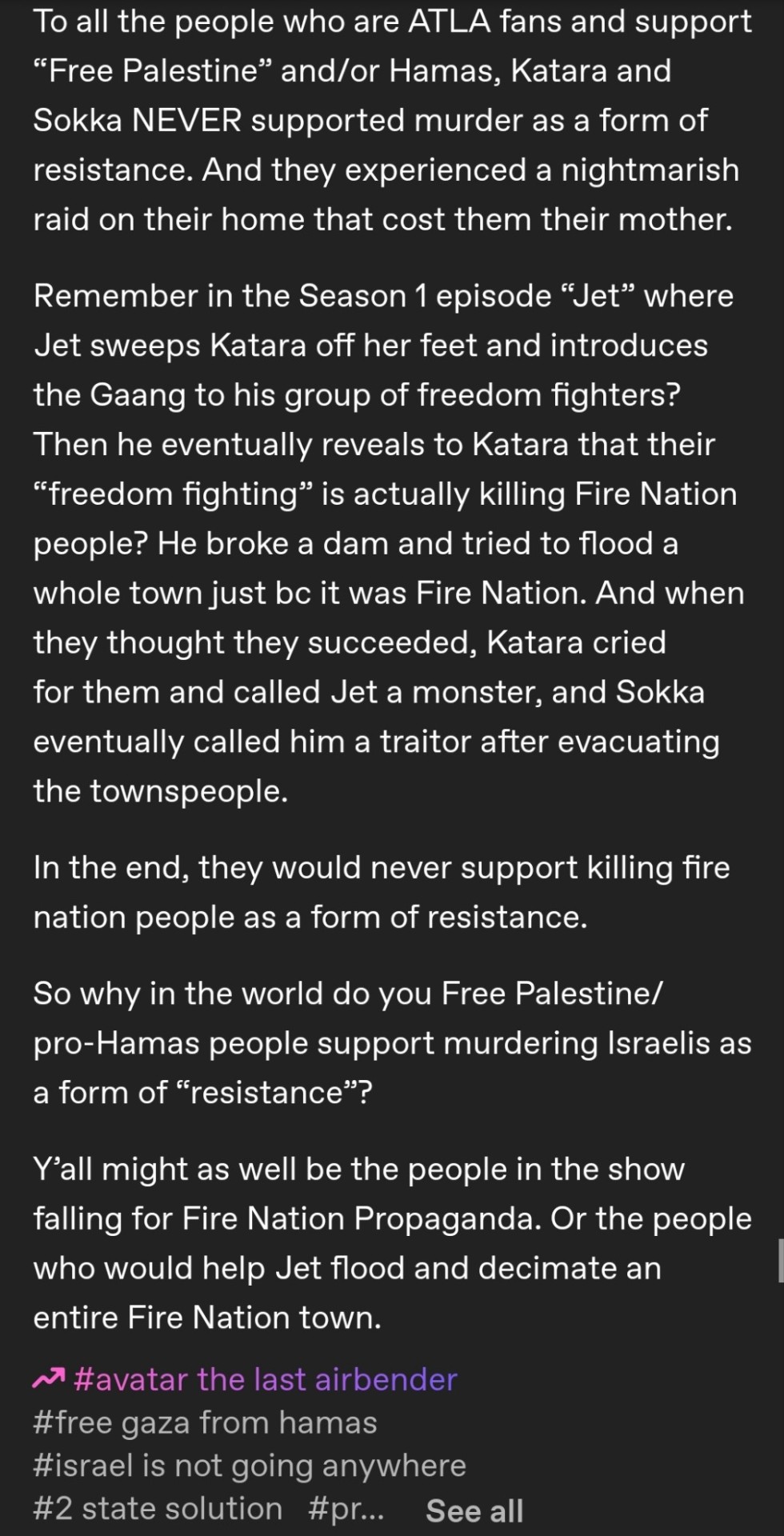
oh my god
a show written by white us americans for us american kids, while often spot on with its anti-imperialism, is not actually the end all be all for how occupied and marginalized peoples can respond to their oppression and genocide. weirdo.
full disclosure I have my problems with the portrayals of jet and hama for this exact reason that i have previously written about here. because ultimately the gaang represent "good" resistance - mostly defensive/nonviolent. jet represents "bad" resistance, namely violent property damage that would have caused civilian casualties if sokka hadn't warned them. and hama, who thanking this op didn't bring up, is supposed to show how trauma can make a person do terrible things but really it just feels like a racist, misogynistic way to both sides colonialism and imperialism.
now unless I'm misremembering the story (I am not) that episode took place in the earth kingdom. why were those innocent fire nation civilians so close to the valley that jet was trying to protect? why was he worried about them encroaching on that valley enough to destroy the dam?
because they were settlers. the fire nation was trying to defeat and occupy the entire world, of course their settlers weren't just innocent civilians, they played a role like all settlers do in all conflicts. and jet and his freedom fighters were all displaced by the fire nation. they were refugees.
in the end, the gaang may have their problems with jet's tactics but they still mourn him and understand that he is RESISTING oppression, and not that he is the same as his oppressor.
katara is UNIQUELY empathetic and decent at times. during the painted lady, she makes it clear that she wants the liberation of ALL - including her oppressors who are also victimized by fire nation imperialism (and capitalism lbr). she sees the class dynamics in the fire nation, sees how they harm the villagers of jang hui. how the military industrial complex poisons fire nation citizens - literally. the problem is that they are happy to take her help when they think she is one of them, but when she reveals herself to be a waterbender, they turn away from her in their racist, xenophobic disgust.
the truth is that katara's form of universal liberatory politics is just one form of resistance against oppression. sometimes atla veers into making it seem like the only acceptable form of resistance, which is quite convenient for the white us americans who wrote the show.
one of atla's main ideas is that imperialism harms everyone, including the beneficiaries of imperialism. it was also written in the early to mid 2000s during the so-called war on terrorism, and with a us american audience in mind. so no I am not surprised that jet isn't seen in a totally positive light, nor am I surprised that the fire nation is occasionally presented in a "not all fire nation" way. it still posits that those innocent civilians are racist/colonizers and frankly complicit in many ways for what the fire nation is doing abroad.
this is why jet isn't a villain, he's just a complicated character. why he is made a martyr. why katara mourns him even if she's angry with him.
as for whether or not katara would condemn hamas... I'm not sure it matters. movements regularly have infighting and disagreements on tactics. even so, atla is a TV show. palestine is a real place with real people who have tried all kinds of forms of resistance. nothing is ever good enough for supporters of the settler colonial project of israel because the point is never, ever to live together in peace. two state solution? where do you see that in atla? if ANYTHING the show calls for pluralism and freedom of movement for all. for an end to nation states and nationalism, as well as preservation of all cultures. liberation for all.
I can't speak to the mess of the comics or lok because I don't care about those but if we're just talking about atla... come on. it's free palestine.
also nice false equivalency between the free palestine movement as a whole and hamas, which is just one part of the movement. racist dipshit genocide apologist.
#the text does not support this bullshit but okay#imagine being a zionist fan of atla 😭😭😭😭#atla#free palestine#anti-zionism#avatar: the last airbender#meta#racism#jet is not the bad guy#long post
28 notes
·
View notes
Text
FINALLY, actual proof. I have found what the difference is between jet propulsion and jet-stepping.
Jet Propulsion
[ID: Picture of Azula propelling in an upward motion on a sustained jet of blue flames]
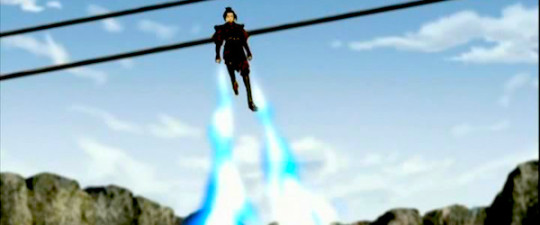
Jet-Stepping
[ID: Picture of Azula propelling herself on blue flames with the movements of someone seen running forward]
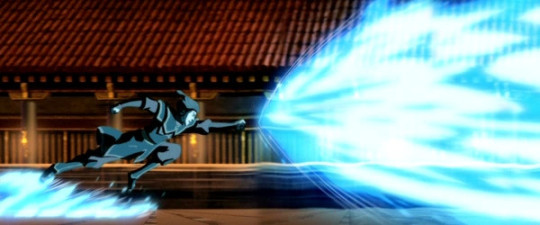
I always wondered why Azula was using actual running movements or in this case stepping movements when she propelled herself at Zuko in The Last Agni-Kai. Well now we can say she was jet-stepping before moving into a sustained usage of jet propulsion.
#I wish I could have found a good gif of azula from the last agni-kai showing actual jet-stepping and not just propelling herself forward#but it's good to know that you can tell the difference by looking and seeing if the firebender is making movement with their legs#azula#firebending meta#atla#avatar: the last airbender#my stuff
167 notes
·
View notes
Text
Final Thoughts before Dead Friend Forever Finale
I had a lot to say about the show and I realized that it would not all fit in one post and I didn't realize how many posts it would actually take me to post it all. So below are the links to everything in one place; my thoughts about each character, theories about how it will end, everything. Thank you for checking it out and I hope everyone is excited to watch the finale.
#dead friend forever#dff the series#barcode tinnasit#be on cloud#copper phuriwat#dff spoilers#fuaiz thanawat#jj chalach#jjay patiphan#mio athens#bump pawat#us nititorn#ta nannakun#jet jetsadakorn#dead friend forever the series#dff series#dff theory#dff meta#dead friend forever spoilers#dead friend forever meta#dead friend forever theory#dff
14 notes
·
View notes